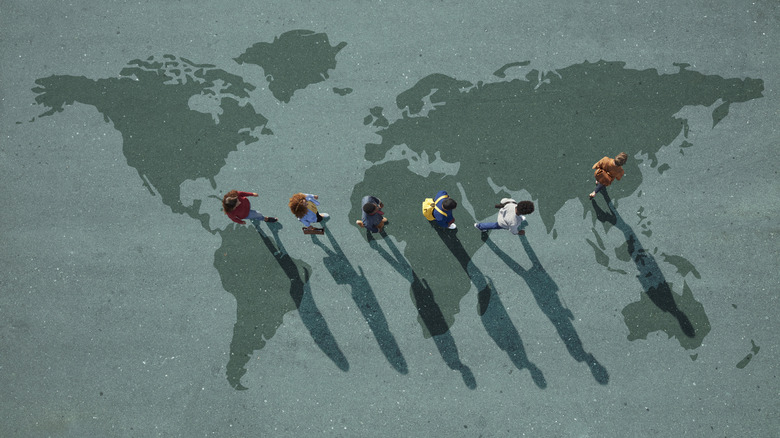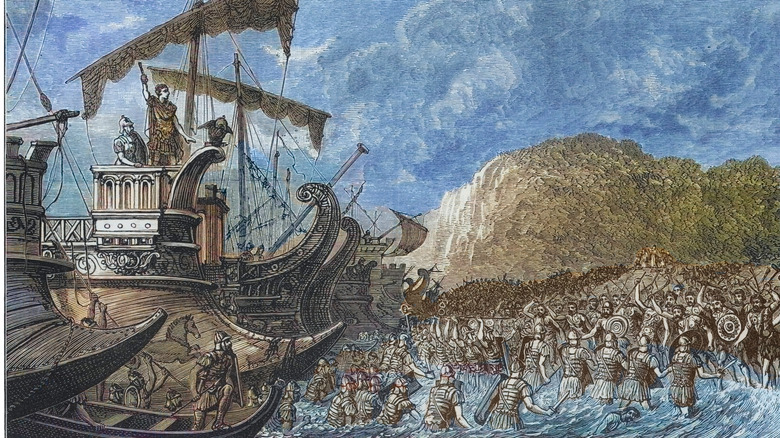What If Humans Had Only Stayed On One Continent?
Almost 2 million years before the first moon landing, someone else took "one small step for man, one giant leap for mankind." It was Homo erectus, the longest-surviving human species in history, and the first hominid to leave the African continent. Archaeological finds indicate that they traveled through the Levant region before dispersing into Europe and Asia, establishing footholds throughout the Eastern Hemisphere.
Other human species followed in the footsteps of Homo erectus, making the same journey beyond their native Africa and into new corners of the globe. Our own species, Homo sapiens, did just this around 200,000 years ago. We took the journey even further, becoming the first hominids known to reach the Americas, which we did by traversing a land bridge between Russia and Alaska that vanished when sea levels rose after the last glacial period ended.
With every step our species took, we grew more diverse. Unique populations evolved in different parts of the world as humans adapted to a wider range of climates. Different regions of the planet offered different foods and natural resources, transforming diets and technologies. Languages developed, along with cultural practices like religion and politics, all informed by the unique aspects of each population's habitat. The world we know today would be impossible without those early migrations across the continents, but what might it look like instead?
Humans would be less diverse
The most apparent and impactful effect of humans remaining in one continent would be a dramatic reduction in diversity. The genetic variations that we label as race are the products of adapting to different environments. Skin color, for instance, is directly correlated to the amount of sunlight that humans are subjected to. Melanin, the substance that gives skin its pigment, is a natural sunscreen that protects from the sun's ultraviolet radiation. Skin color is typically darkest in areas that get extreme sunlight and little shade, like the African savanna where the earliest humans evolved. Human populations that later spread to Europe lost the melanin in their skin in order to better absorb vitamin D, which was scarce in a land with far less sunshine. Skin colors would be far more homogenous if our species had stayed bound to its native continent.
Another factor in genetic diversity is the remnants of extinct human species that interbred with Homo sapiens. Some humans today have as much as 4% Neanderthal DNA, and Neanderthals weren't the only extinct species to mate with Homo sapiens. Populations in southeast Asia and Oceania carry DNA from other hominid lines. However, these other human species evolved after the exodus of Homo erectus to Eurasia. That's why Neanderthal DNA is only found in people with ancestors outside Africa. If we had exclusively stayed on that continent, nobody would bear a trace of Neanderthal because they would never have existed in the first place.
Our diets would be completely different
If humans had not ventured beyond their native continent, many of the most widely-consumed staple foods would be completely unknown to us. Wheat and corn are ubiquitous elements of numerous global cuisines, but neither crop is native to Africa, where our species arose. Wheat is endemic to Southwest Asia, in the famed Fertile Crescent region where organized human civilizations first arose following the exodus from Africa.
Corn, or maize, as it is also known, evolved from a type of wild grass native to central Mexico, a place that humans didn't settle until over 100,000 years after the first Homo sapiens left Africa. If our ancient ancestors had remained bound to their original continent, wheat and corn products like bread, beer, pasta, corn syrup, hominy, and grits would not exist as we know them.
Today, rice is the main staple of more than half the world's population, but it might not be if our species hadn't left Africa. Rice was first domesticated in Asia, where farmers began cultivating the species Oryza sativa over 8,000 years ago. That doesn't mean it would be wholly unknown to humans without the exodus. Thousands of years after O. sativa was domesticated, farmers domesticated a species of rice native to West Africa called O. glaberrima. However, the African species does not produce as high a yield as Asian rice plants do, meaning that rice would likely still factor into many people's diets, but it would not serve as the overwhelming staple it is today.
Many common goods would not be available
If our ancestors had stayed on their native continent, they never would have discovered the raw materials required to make some of our most widely-used goods. Take cotton, for instance. Around half of all the fabric used worldwide is made from cotton, and it is also used to make cooking oil, biofuel, and first aid supplies like bandages, cotton swabs, and gauze. It's the most profitable non-food crop, according to the World Wildlife Fund, but humans wouldn't even know about it if our species hadn't traveled out of Africa and into the Middle East and the Indus River Valley, where cotton plants are native.
Today, cotton has adapted to survive beyond its native range, and is grown in parts of Africa, but it would never have reached there if ancient humans hadn't left. Silk and wool are two other textile materials we also wouldn't have, as silkworms are native to China, and there are no wild sheep species endemic to Africa.
There are also vital materials that, although technically found in Africa, would be in much shorter supply had humans remained bound to the continent. African countries rank very low in global iron ore reserves, with Nasdaq reporting that all but one of the world's top 10 producers are all located on other continents. Iron is a component of steel, the world's most widely-used metal and the breakthrough that allowed us to build skyscrapers. Without a strong iron ore supply, urban density would be significantly more limited.
We would have domesticated fewer animals
There are over 100,000 animal species native to Africa, but this menagerie does not include several of the most important animals in human culture. Horses evolved in North America, and made the opposite journey across the Bering land bridge as our ancestors, traveling into Eurasia. A study published in Nature determined that humans first domesticated horses in the region of modern-day Russia, based on DNA sequenced from nearly 300 ancient horses. From there, horses went on to transform our civilizations, becoming our primary means of long-distance travel for centuries. This led to the invention of carriages, which subsequently served as the model on which automobiles were based. It's hard to imagine a world where these technologies did not develop as we know them.
Dogs are the most popular pets in the world, according to research firm NIQ, but you wouldn't have your furry friend if ancient humans hadn't spread to other continents. Today's domestic dogs are direct descendants of gray wolves, which evolved in Asia. Dogs were originally domesticated over 20,000 years ago in a climate as far from our native home as could be: ice-age Siberia. The first ancient cultures that fell in love with their dogs were in Eurasia. There are several canine species endemic to Africa, including multiple species of wolves and jackals, so it is certainly possible humans would domesticate dogs even without leaving the continent. However, those hypothetical pets would be quite different from the ones we know today.
Industrialization would be limited
The Industrial Revolution was primarily instigated by Europe's move towards coal power. In 1712, English engineer Thomas Newcomen invented the first practical coal-fired steam engine. This was later adapted by James Watt into the famous Watt steam engine, which served as the primary power source for factories, mills, mines, and transportation throughout the Industrial Revolution. The rise of steam locomotives and steam ships, which allowed humans to travel great distances more efficiently, was based on the emergence of coal as the leading fuel source.
This entire process would have been very unlikely had humans never left Africa. Our native continent only contains about 5% of the world's coal reserves, according to the USGS. Of the inhabited continents, only South America has less. If humans only had access to this small supply, we would have little, if any, left to use at this point. It is only logical that, the less of the world we occupied, the fewer natural resources we would have to take advantage of.
On the other hand, there is one natural resource that Africa beats all other continents in, and that's sunlight. Africa receives more cumulative hours of sunshine than any other place on Earth, earning it the nickname, the "Sun Continent." According to The Telegraph, Africa accounts for roughly 60% of the world's solar power potential, and although most of that energy is untapped now, we might be more ahead of the game if our species could only tap into the natural resources of one continent.
There would be major political consequences
Throughout human history, our politics have been shaped by our geographical movements, and nowhere is this more apparent than in the rising and falling of empires. Empires are based upon relentless expansion, and the most powerful ones in history were those that spanned continents. The Roman, Spanish, and British Empires were all built by journeying across the seas to other continents. The Mongol Empire was built by land, but only through the power to travel long distances on horses, while centuries later, the United States was able to expand across North America with the aid of railways; neither method of transportation would exist as we know it had humans not moved beyond Africa.
With empires came colonialism, subjugating millions, and creating vast wealth inequality between the colonizers and the colonized. Before the age of colonialism began, wealth inequality between nations still existed, but was much less extreme.
Few forces have a greater impact on politics, and human life as a whole for that matter, than religious institutions, but the religions that dominate the globe wouldn't exist if not for the African exodus. The world's three most-practiced religions today are Christianity, Islam, and Hinduism. The first two originated in the Middle East while the latter originated in the Indian subcontinent. Perhaps if humans had stayed exclusively on their native continent, one of the religions that eventually evolved in Africa, such as Egyptian polytheism or Bantu monotheism would be dominant today.
We would have different diseases
Humankind's exploratory spirit took us across continents, but in doing so, we also exposed ourselves to an ever-expanding world of pathogens that we could have much rather done without. The infamous bubonic plague, which caused the Black Death pandemic that killed nearly a third of Europe's population in the mid-1300s would not even be known to humans had we remained bound to our native home. Plague is caused by a bacterium called Yersinia pestis, which was transferred from rodents to humans via flea bites. Yersinia pestis bacteria are endemic to central Asia. They were then spread via the Silk Road to the Middle East, Europe, and Africa, where several epidemics subsequently took place.
One disease humans would certainly still be exposed to had we all stayed in Africa would be malaria. The parasite that causes it, Plasmodium vivax, is endemic to central Africa, where it is still most widely found. If not for the exodus, however, malaria would be much more dangerous. The most significant breakthrough in treating malaria was the discovery of quinine, which kills P. vivax parasites. The problem is, quinine is not found in Africa; it comes from the Cinchona tree, which is native to the tropical Andes in South America. Without this resource, malaria cases and deaths would likely take a much greater toll on human society.
The climate crisis might be averted
One positive thing that would have come from humans remaining on just one continent is the potential to avoid the devastating effects of global warming. The less of the world we touch, the less we can destroy. Africa could still be impacted by anthropogenic climate change, but because we would have far less access to fossil fuels like coal, we would not be generating anything close to the amount of greenhouse gas output we do now. Having less area to occupy and less genetic diversity would limit the human population to well below its modern levels, which would also alleviate pressure on the environment.
If humans had never left their native continent, untold lives would have been saved in the animal kingdom. Although it is impossible to get a firm count on how many species have gone extinct due to the impact of human beings, LiveScience estimates the number at 381,150, and that's only in the last 500 years. The continents facing the highest threats of extinction are South America and Australia, even though they were some of the last places that Homo sapiens expanded to. Imagine a world where humans had never gotten their hands on the Amazon rainforest or the Great Barrier Reef. Sure, our lives would be more restricted had we never reached other continents, but the lives of countless other species would be vastly improved.








